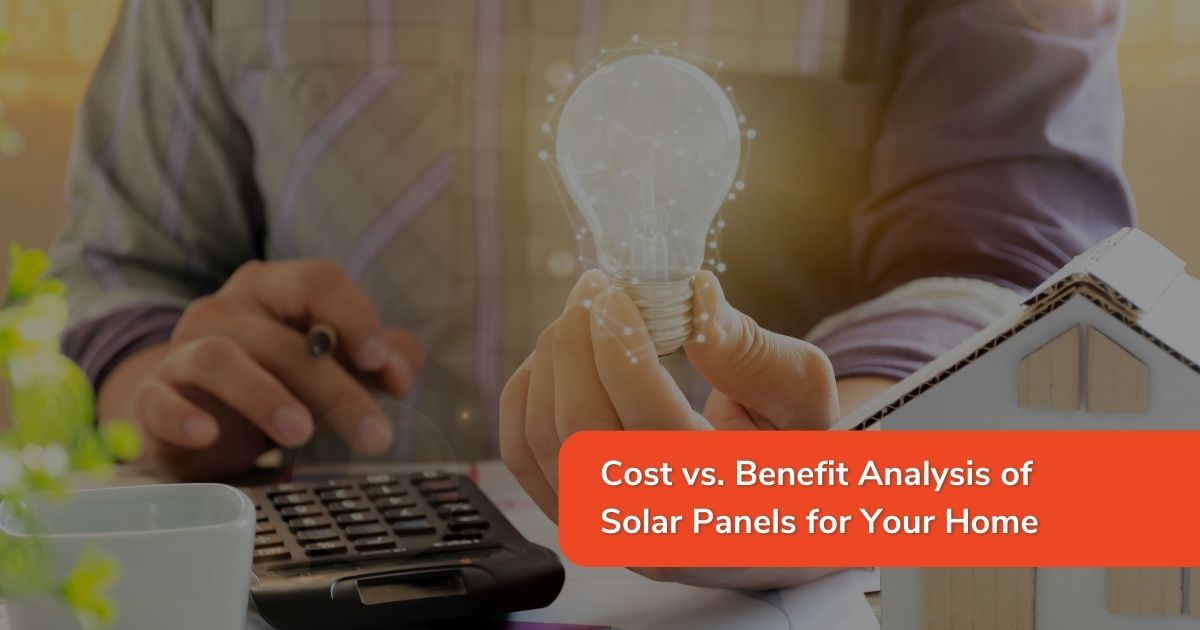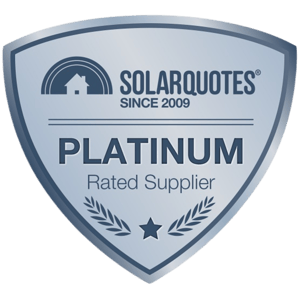Cost vs. Benefit Analysis of Solar Panels for Your Home

Australia is witnessing a surge in interest in solar energy, fueled by a shared commitment to sustainability and financial responsibility. Before delving into the world of solar panels, homeowners must conduct a comprehensive cost vs. benefit analysis. Let's explore the environmental and financial advantages, potential costs, and how to make an informed decision.
The Benefits of Solar Panels
Investing in solar panels for your Australian home brings forth an array of compelling advantages that extend beyond the conventional realms of cost savings. Let's delve deeper into the multifaceted benefits that solar energy has to offer:
Environmental Impact
At the forefront of solar advantages lies its profound positive impact on the environment. Solar panels harness the power of the sun, a clean and renewable resource, to generate electricity. By opting for solar energy, you significantly reduce your carbon footprint, mitigating the harmful effects of traditional energy sources. This conscientious choice contributes directly to a cleaner and more sustainable future, aligning with global efforts to combat climate change.
Financial Advantages
Beyond the altruistic benefits, embracing solar power translates into tangible financial gains. One of the most immediate perks is the substantial reduction in electricity bills. Solar panels convert sunlight into electricity, providing a reliable and renewable source that diminishes your reliance on grid-supplied power. As a result, your monthly energy expenses decrease, offering homeowners a consistent and long-term solution to rising energy costs.
Furthermore, governments recognise the importance of solar energy adoption and often provide enticing incentives and rebates for solar installations. These financial rewards not only offset initial setup costs but also accelerate the overall return on investment, making solar energy an economically viable and financially prudent choice.
Energy Independence
Solar panels herald a paradigm shift towards energy independence. By harnessing the sun's power directly on your property, you reduce dependence on traditional energy sources, such as coal or natural gas. This newfound autonomy empowers homeowners with increased control over their energy production and consumption. Solar-equipped households can generate their electricity, thereby mitigating the impact of external factors, such as energy price fluctuations or grid failures.
The ability to produce clean and sustainable energy at your doorstep not only provides peace of mind but positions you as an active contributor to a more resilient and decentralised energy landscape.
The Costs Associated with Solar Panels
While the prospect of harnessing solar power for your home is undoubtedly appealing, it's essential to navigate the associated costs with a clear understanding. Let's explore the financial considerations involved in adopting solar panels and how they unfold over time:
Initial Investment
Undoubtedly, the initial cost of acquiring and installing solar panels can be a substantial investment. However, it's crucial to view this expenditure not just as an expense but as a strategic investment in a sustainable future. Fortunately, various financing options exist to alleviate the upfront financial burden. From government-backed solar incentives to flexible financing plans or pay-as-you-save payment schemes offered by solar providers, homeowners have access to avenues that make the transition to solar energy financially viable.
Maintenance and Operational Costs
While the promise of clean energy is enticing, it's important to acknowledge that solar panels do require regular maintenance to ensure optimal performance. Cleaning and occasional checks are necessary to keep the system operating efficiently. The good news is that these maintenance costs are relatively low compared to the potential savings on your electricity bills.
Additionally, the expected lifespan of solar panels is impressive, making them a worthwhile, long-term investment. With proper care and maintenance, solar panels can continue to generate clean energy for your home for well over two decades. This longevity not only justifies the initial investment but also positions solar energy as a reliable and enduring solution.
The Return on Investment (ROI) Analysis
Calculating the Payback Period
A crucial aspect of the financial equation is understanding the payback period – the time it takes to recoup your initial investment through energy savings. Assessing energy savings over time helps determine how quickly you'll start seeing a return on your solar investment. Government incentives and rebates further expedite this process, enhancing the financial appeal of solar panels.
Long-term Financial Benefits
Solar panels offer more than just immediate financial relief; they contribute to long-term financial stability. Beyond reducing your monthly electricity bills, solar-equipped homes often experience an increase in property value. The investment in renewable energy adds a valuable asset to your property, appealing to environmentally conscious buyers and providing a competitive edge in the real estate market.
Moreover, as energy costs continue to rise, solar panels act as a safeguard against future increases. By generating your electricity, you insulate yourself from the impact of fluctuating energy prices, ensuring a consistent and controlled energy expenditure over the years.
Understanding Your Energy Consumption
Analysing Past Electricity Bills
Dive into your previous electricity bills, dissecting the detailed information they provide. Look for patterns in energy consumption, considering both daily and seasonal fluctuations. Identify peak usage periods and scrutinise any major appliances or activities contributing significantly to your energy consumption.
By scrutinising historical data, you'll gain insights into how your household consumes energy, enabling you to make informed decisions when transitioning to solar power.
Estimating Future Energy Needs
Once armed with a comprehensive understanding of your historical energy usage, you can make informed projections for the future. Consider any upcoming changes in your household, such as the addition of new appliances, changes in occupancy, or plans for energy-intensive activities.
Factor in seasonal variations, accounting for increased energy usage during hotter or colder months. Evaluating future energy needs ensures that your solar panel system is tailored to meet the demands of your evolving lifestyle, providing an optimal and cost-effective solution.
Making an Informed Decision
- Weighing the Benefits Against the Costs: Consider the environmental and financial benefits against the initial and operational costs.
- Seeking Professional Advice: Consult with solar experts to receive personalised advice and quotes tailored to your home.
- Taking Advantage of Resources and Tools: Utilise government websites and online solar calculators to gather valuable information for an informed decision.
Conclusion
As Australian homeowners consider the switch to solar energy, weighing the benefits against the costs is crucial. The environmental impact, financial advantages, and potential for energy independence make solar panels an attractive investment. By making informed decisions based on your home's solar potential and seeking professional advice, you can contribute to a sustainable future while enjoying long-term financial benefits.
Ready to make the switch to a smarter, greener energy solution? Explore personalised solar solutions with Smart Energy Answers and unlock the full potential of solar energy for your Australian home.
%20(1).png?width=265&height=96&name=www.smartenergyanswers.com.auhs-fshubfsSmart%20Energy%20Answers%20Logo%20(HIRES)%20(1).png)

.png?width=514&height=121&name=Tesla%20Powerwall%203%20(new).png)







